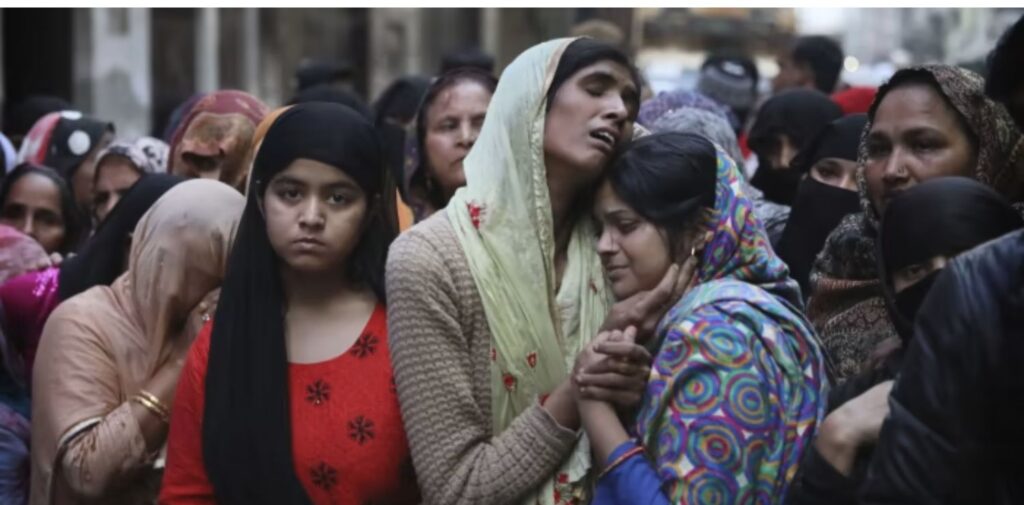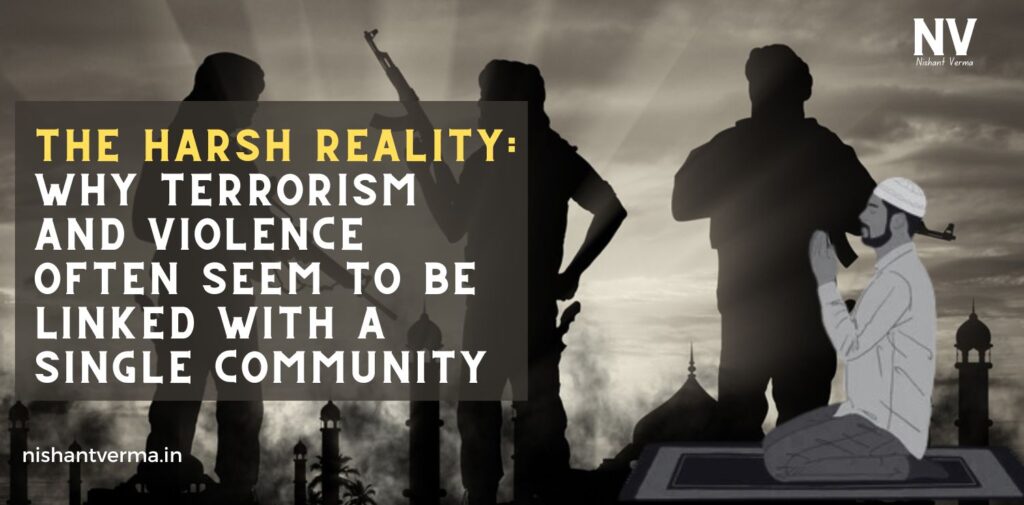In the modern world, we often hear the phrase, “Terrorism has no religion.” It’s a widely accepted notion that terror and violence should not be tied to any specific group. However, in recent years, many people have begun to question this idea because a disturbing pattern keeps appearing. Whether it’s terrorism, mob lynching, love jihad, or violence against women, why do we often find that people from the same community – Islam – are disproportionately involved in these activities? This is a sensitive topic, but one that needs to be explored and understood if we are to address the root causes of such issues.
The Global Pattern of Islamic Terrorism
When we think of terrorism, many of the world’s most notorious attacks are linked to Islamist organizations or individuals who identify with Islam. From the September 11 attacks in the United States, the Paris attacks, and the 26/11 Mumbai attacks, to the rise of ISIS and Al-Qaeda, the majority of these horrific acts have one thing in common: the perpetrators are Muslim.
Now, it’s essential to make one thing clear: this is not to say that all Muslims are terrorists, or that Islam as a religion promotes violence. Millions of Muslims around the world live peacefully and contribute positively to their communities. But the undeniable fact is that most terrorist groups today justify their violent actions using Islamic rhetoric and religious principles. Why is this the case?

Misinterpretation of Religion or Something Deeper?
Many apologists argue that the individuals involved in terrorism are not true Muslims but rather extremists who misinterpret the teachings of Islam. They claim that Islam is a peaceful religion, and the actions of a few do not represent the whole. But if this is true, why do we keep seeing Islamic verses being invoked in terror activities? Why do terrorist organizations like ISIS, Al-Qaeda, Boko Haram, and others use the Quran and Hadith to justify their actions?
The sad truth is that there are parts of Islamic teachings that can be interpreted to promote violence against non-believers, subjugation of women, and jihad (holy war) against those who do not follow Islam. These interpretations are not the fringe ideas of a few radicals, but in many cases, are supported by Islamic scholars and clerics across different countries. The idea of martyrdom, the promise of eternal reward in paradise, and the concept of jihad have been deeply ingrained in the minds of those who carry out such acts of terror.
Love Jihad and the War on Culture
In India, we hear about “love jihad,” a term used to describe a conspiracy where Muslim men allegedly lure non-Muslim women into relationships to convert them to Islam. While some dismiss this as an exaggerated or even baseless accusation, there have been numerous reports of young Hindu and Christian women being coerced, manipulated, or pressured into converting to Islam under the guise of love.
This isn’t just an issue of religion or personal choice – it’s seen as part of a larger strategy to alter the demographics of non-Muslim communities. The concept of “love jihad” ties into the wider narrative of Islamic expansionism, where every method, from marriage to terror, is considered a legitimate means to spread Islam and weaken other faiths.

Violence Against Women: Is There a Religious Link?
It is troubling to see how often crimes against women, particularly rape, are linked to perpetrators from the Muslim community. While rape and violence against women exist in all societies, the instances where Islamic principles are invoked to justify such acts are alarming. In certain interpretations of Islam, women are viewed as subservient to men, and their autonomy is often controlled by male figures in their lives. In some parts of the world, Muslim clerics have gone as far as to justify sexual violence against non-Muslim women as an act of war, claiming that such actions are permitted under Islamic law.
The cases of sexual grooming gangs in the UK, for example, where predominantly Muslim men targeted young, vulnerable non-Muslim girls, have shocked many. The perpetrators saw these girls as ‘easy’ and ‘disposable’ because they did not belong to the Muslim community, further highlighting the disturbing intersection of religion, race, and violence.

Mob Lynchings and Blasphemy Laws: The Intolerance Is Real
In Muslim-majority countries, blasphemy laws have been used to lynch and kill people for offences as trivial as criticizing Islamic practices or refusing to convert. Non-Muslims, in particular, are at risk of being falsely accused of blasphemy, which often leads to violent mob attacks or even state-sanctioned executions.
Pakistan, for instance, has seen numerous cases where innocent people were lynched by mobs after being falsely accused of insulting Islam. This intolerance for any form of dissent or criticism of Islam is not only alarming but shows the dangerous levels of fanaticism within certain Islamic communities.
Why Is There Silence?
One of the most frustrating aspects of this pattern of violence is the relative silence from so-called moderate Muslims and global leaders. When terror attacks occur, there is often a rush to separate the attackers from Islam, with statements like “This is not real Islam.” However, very few leaders or Islamic scholars are willing to address the root causes of why these acts keep happening within the Muslim community.
This silence can be attributed to fear, denial, or political correctness, but it does nothing to help the situation. Until the Islamic world takes responsibility for these issues and acknowledges the problematic interpretations within its faith, the cycle of violence will likely continue.
What Can Be Done?
It’s crucial to approach this issue with both clarity and caution. The world must recognize that terrorism and other forms of violence, such as love jihad and mob lynchings, are disproportionately linked to people from the Islamic community. This doesn’t mean all Muslims are guilty, but there is a need for internal reform within the community.
Education is key. If young Muslims continue to be taught interpretations of Islam that promote violence, hatred, and intolerance towards non-Muslims, the future will remain bleak. Islamic leaders, clerics, and governments need to take an active role in reforming the way Islam is taught, particularly in madrasas, where radical ideas often take root.
Additionally, the global community needs to hold accountable those who promote hate and violence in the name of religion. Whether through stricter laws, stronger counter-terrorism measures, or international pressure on countries that harbour and support extremism, decisive action is required.
Conclusion: Terrorism and violence
The question of why terrorism and violence seem disproportionately linked to one community is a difficult and uncomfortable one, but it must be asked. Until we address the root causes – the misinterpretation of Islamic teachings, the silence of moderates, and the lack of reform within the community – we will continue to see this disturbing pattern repeat itself. Terrorism may have no religion, but ignoring the elephant in the room does a disservice to the victims of violence and hinders the pursuit of a safer world.




